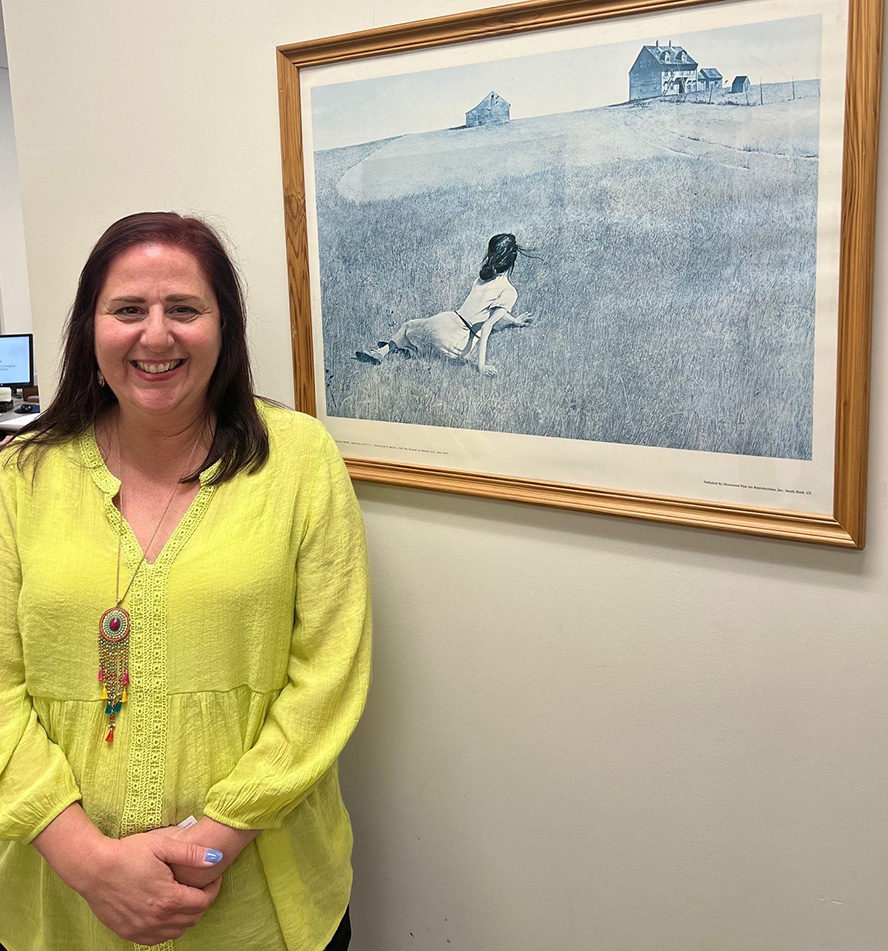She Moves Ahead, with God’s Support, in Therapy and Life
 Pamela Parkes has been treated at Catholic Charities Mental Health Clinic in Bay Shore post-Covid. She didn’t arrive with a referral but had heard many good things about Catholic Charities. “Knowing the name in the community I felt comfortable coming here,” she said. “Everyone has been great.”
Pamela Parkes has been treated at Catholic Charities Mental Health Clinic in Bay Shore post-Covid. She didn’t arrive with a referral but had heard many good things about Catholic Charities. “Knowing the name in the community I felt comfortable coming here,” she said. “Everyone has been great.”
That’s not to say everything is perfect or ever was. Parkes, who will be 50 next year, has been treated since her diagnosis of bipolar disorder when she was 21.
There were dark periods, like a two-year psychosis, complicated by drug and alcohol use, which left her nearly unable to speak. She had to relearn how to converse, and relieve her anxiety, and become able to retain focus.
Treatment, at times, has been a struggle. Some therapists treated her like there was something wrong with her, which has never been the case at Catholic Charities.
Parkes finds herself in a much better place now. She appreciates being able to discuss her decisions, such as those on behalf of her father, for whom she is a caretaker. “In my mind, I need to get an outside perspective on decision-making confirmation,” she said. “I need to bounce things off other people and work things out.”
She credits God for never abandoning her, even when times were tough. “The most important part of my whole story is the spiritual experiences I’ve had,” Parkes said. “I really think God saved me. I was totally delusional and thought I was on the right path and really wasn’t. And had those moments of clarity, and think that was God.”
Her viewpoint would not be embraced in all therapeutic environments. Maureen Farrell, L.C.S.W., coordinator of the Bay Shore clinic, indicated that she finds most clients at Catholic Charities seek to address spiritual topics.
The Bay Shore clinic treats 250 to 300 clients each week and sees clients with a range of incomes, including some receiving Medicaid. “Usually our population falls through the cracks because they don’t have a lot of clinics where they can afford to get treatment, so we are a great resource,” said Farrell, a Cognitive Behavioral Therapist.
Farrell enjoys micro-learning, especially finding fact-based answers for clients. She likes to explore what clients want to do by reviewing the choices and potential outcomes, so they can make the best decision.
She did not address treating Parkes, but their solid rapport was clear during the interview. “I needed someone to speak into my life and speak the truth and give me clarity on a lot of things,” Parkes explained. “Maureen is great at that. She’s very knowledgeable in her field. She’s always giving me great resources and different people to listen to and different strategies.”
Parkes’ background in education comes in handy these days as she works as a financial coach in a business with her husband, Theodore. Finances are a huge stressor in people’s lives and she appreciates being able to help businesses and individuals make sound financial decisions. “It’s more of a passion, and I still get to teach,” she said.
Parkes does not think her current life with her husband would have been possible before she benefited from professional help. “He’s a good man. I don’t think I would have attracted that person in the beginning, if I didn’t work on myself.”
Through therapy, she learned to cut ties with some people as her life was beginning to turn around. “I couldn’t be around the same people when I was getting better,” she said. “It’s all part of accepting and wanting to get better. It’s a process.”
Medication administered by a psychiatric nurse practitioner is another part of her treatment plan. Farrell provided statistics that show outcomes are improved by treatment including both therapy and medication. Patients receiving a combination of psychological and drug therapy are 27 percent more likely to respond than those receiving psychotherapy alone, and 25 more likely to respond than those receiving drug treatment alone.
“The best part of this job is getting to see clients grow,” Farrell said. “It’s 50-50. You do your part and they do their part, and they get better.”
Parkes said God has given her the “gift of remembering” and that helps bring her hope and a mission for others. “I can differentiate what happened but also, like, how did I get out of it and how can that benefit someone else.”
Catholic Charities of Long Island operates mental health outpatient clinics in Bay Shore and Medford, and also provides residential opportunities for adults struggling with mental illness. CCLI’s programs and services share the love of Jesus by offering dignified and compassionate care to poor and vulnerable neighbors of every faith and background.